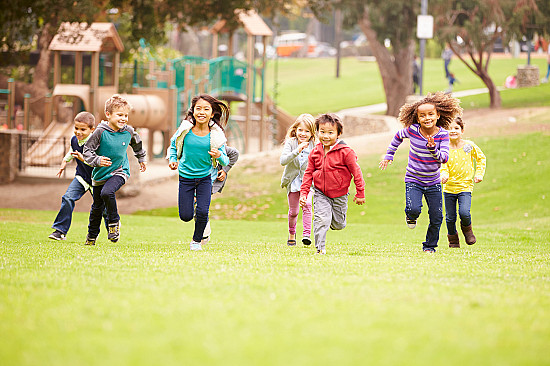Playing outside provides a refreshing pause in the day’s schedule and offers young children many different learning experiences. Children can shout or be quiet, build larger structures, play games that require more expansive movements and explore the world through their senses.
The outdoor environment provides opportunities for natural open ended materials, referred to as loose parts. These are essential for children to learn.
Physical activity
The kinetic energy that kids release as they run, jump, climb and play outdoors is vital for their healthy development. In fact, it can help kids stay active longer, ward off obesity and improve their sleep habits and overall mood.
In early learning settings, educators often set aside time for outdoor play in the classroom, and then allow children to choose their own activities. This approach allows children to have a more natural transition into play and also teaches them how to make decisions in an unstructured environment. In addition, many young children have a natural love for the outdoors and will play outside even when it is cold or wet, especially if they can listen to their bodies’ cues as to whether they are overheating or not.
Outdoor play in all weather conditions can inspire kids to try new things, such as ice skating or snowboarding. This can build confidence, self-esteem and social skills. In addition, it can also promote cognitive learning and boost motor skills.
Social interaction
Spending time outdoors builds social connections with children and adults. It encourages kids to interact physically and mentally with their friends, and develops social skills like empathy. This is especially important in the modern world when kids are often glued to digital devices.
It also teaches kids grit and resilience. Kids who play in winter and other challenging weather learn that they can keep going even when things are tough. These lessons will serve them well in life as they navigate challenges and obstacles in their future careers and personal lives.
Outdoor play also gives kids a chance to discover new things. The change in environment piques their interest and encourages them to ask questions. It also helps them to develop problem-solving skills. It also promotes cognitive thinking as they assess and overcome risks, such as slippery surfaces, during their play.
It’s also important to remember that not all outdoor spaces are created equal. Some offer a rich array of natural resources that can enhance play in any weather condition. These spaces are often free and can be easily accessed by kids. They often provide more opportunities for social interaction and cognitive learning, especially if they have ‘loose parts’, which are objects that can be moved around to shape play. They may include sticks, twigs, mud, rocks and water, as well as other materials.
Mental health
As well as the physical benefits, outdoor play allows children to engage with their environment emotionally and socially. Being in nature, whether a local park or wilderness area, has been shown to improve attention and concentration, reduce levels of the stress hormone cortisol, lower blood pressure and increase feelings of happiness and wellbeing. It has also been linked with higher rates of empathy and cooperation.
Getting outside in all weather conditions is important for a child’s emotional and social health as it helps them to feel connected with nature, their community and the world. This is especially important as children spend so much time indoors focused on their school work and screen time.
Being outdoors helps children develop a sense of wonder and curiosity, which in turn leads to learning about their local environment and the natural world. This is particularly important in the winter, when children can explore how their environment changes with the seasons. For example, playing in the snow gives them an opportunity to see that the world is not a static place and that there are many different aspects of nature that can be explored and enjoyed, even when it is cold. The use of the natural environment and moveable resources, or ‘loose parts’, provides further opportunities for exploration and discovery, such as making a den, building a snow castle or a kite flight.
Learning
Playing outdoors provides a range of new challenges that encourage children to assess risks in their environment and adapt their play accordingly. It can also help them develop cognitive thinking by developing creative solutions to problems they encounter in their games.
In addition, outdoor play allows children to interact with their environment on a different level as the seasons change. They can explore textures, smells and changes in the colour of their natural surroundings. They can also experience snow and ice for the first time. These experiences can help children become familiar with their environment and develop a sense of belonging to the place they live in.
Moreover, playing outdoors can help kids stay fit and healthy and reduce the risk of obesity. Studies show that children need at least three hours of vigorous physical activity every day. By allowing them to play outdoors, they can get the necessary amount of exercise without feeling bored or stressed.
It is important for early years practitioners to recognize the importance of outdoor play in all weather conditions. Many practitioners believe that wet weather is a barrier to children’s learning, but it is important for them to understand that the climatic conditions do not affect the nature and benefits of outdoor play. The pedagogical significance of outdoor play is what determines whether it is beneficial or not.

